
 i_need_contribute
i_need_contribute

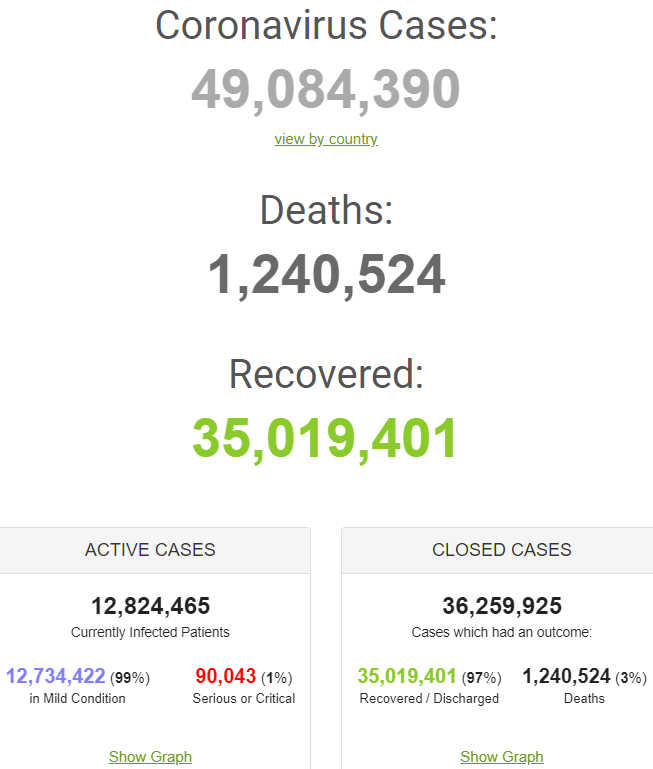
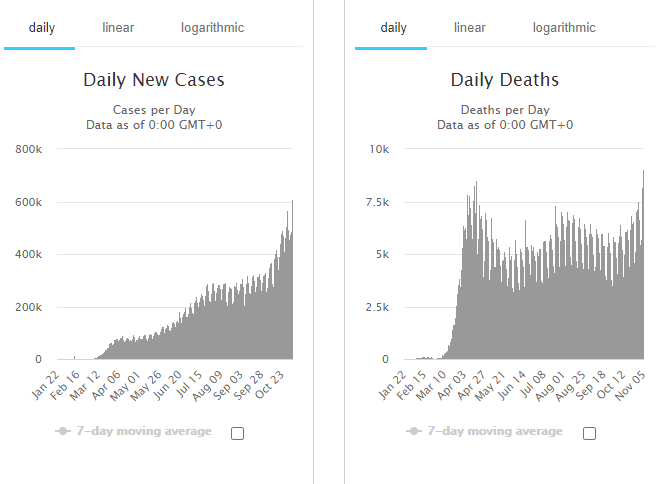
|
Country, |
Total |
New |
Total |
|
World |
49,014,885 |
+608,550 |
1,238,879 |
|
9,919,637 |
+118,319 |
240,955 |
|
|
8,411,034 |
+47,622 |
125,029 |
|
|
5,614,258 |
+23,317 |
161,779 |
|
|
1,712,858 |
+19,404 |
29,509 |
|
|
1,601,367 |
+58,046 |
39,037 |
|
|
1,365,895 |
+21,908 |
38,486 |
|
|
1,217,028 |
+11,100 |
32,766 |
|
|
1,123,197 |
+24,141 |
48,120 |
|
|
1,117,977 |
+9,893 |
32,209 |
|
|
943,630 |
+5,225 |
93,228 |
|
|
914,722 |
+2,935 |
34,730 |
|
|
824,879 |
+34,505 |
40,192 |
|
|
732,414 |
+1,866 |
19,677 |
|
|
654,936 |
+8,772 |
36,985 |
|
|
619,116 |
+21,757 |
11,190 |
|
|
516,582 |
+1,540 |
14,404 |
|
|
489,571 |
+3,701 |
11,175 |
|
|
468,213 |
+14,903 |
12,331 |
|
|
466,679 |
+27,143 |
6,842 |
|
|
430,467 |
+9,850 |
7,924 |
|
|
425,796 |
+4,065 |
14,348 |
|
|
416,006 |
+1,842 |
6,021 |
|
|
391,945 |
+13,229 |
4,330 |
|
|
390,488 |
+6,965 |
7,769 |
|
|
389,717 |
+1,586 |
7,409 |
|
|
386,820 |
+2,311 |
10,639 |
|
|
349,386 |
+450 |
5,489 |
|
|
338,875 |
+1,302 |
6,893 |
|
|
317,863 |
+531 |
2,639 |
|
|
276,802 |
+9,714 |
7,540 |
|
|
251,338 |
+3,635 |
10,381 |
|
|
240,951 |
+5,641 |
4,059 |
|
|
185,974 |
+3,051 |
1,052 |
|
|
171,783 |
+350 |
12,730 |
|
|
161,350 |
+4,410 |
2,740 |
|
|
142,062 |
+126 |
8,758 |
|
|
138,599 |
+1,289 |
508 |
|
|
136,567 |
+543 |
2,756 |
|
|
133,619 |
+249 |
232 |
|
|
132,515 |
+7,416 |
1,268 |
|
|
129,638 |
+795 |
799 |
|
|
Dominican |
128,824 |
+546 |
2,260 |
|
117,167 |
+320 |
1,286 |
|
|
114,367 |
+1,106 |
1,444 |
|
|
114,235 |
+494 |
1,857 |
|
|
109,849 |
+702 |
3,766 |
|
|
108,530 |
+201 |
6,329 |
|
|
103,838 |
+938 |
1,794 |
|
|
103,295 |
+982 |
998 |
|
|
99,563 |
+2,413 |
1,476 |
|
|
99,124 |
+436 |
2,730 |
|
|
98,391 |
+510 |
1,508 |
|
|
95,864 |
+4,630 |
1,069 |
|
|
94,916 |
+3,928 |
2,147 |
|
|
93,921 |
+441 |
819 |
|
|
89,186 |
+2,089 |
683 |
|
|
86,115 |
+28 |
4,634 |
|
|
82,786 |
+162 |
328 |
|
|
79,566 |
+1,059 |
1,866 |
|
|
68,734 |
+1,962 |
286 |
|
|
68,345 |
+3,754 |
1,518 |
|
|
68,009 |
+230 |
579 |
|
|
66,334 |
+1,971 |
1,577 |
|
|
65,778 |
+520 |
1,462 |
|
|
65,440 |
+853 |
907 |
|
|
64,046 |
+563 |
1,933 |
|
|
63,508 |
+180 |
1,155 |
|
|
61,309 |
+535 |
1,167 |
|
|
60,873 |
+1,364 |
794 |
|
|
60,169 |
+642 |
2,011 |
|
|
59,595 |
+1,008 |
1,072 |
|
|
59,415 |
+2,848 |
683 |
|
|
58,043 |
+7 |
28 |
|
|
57,935 |
+995 |
1,352 |
|
|
56,672 |
+582 |
508 |
|
|
55,676 |
+2,181 |
861 |
|
|
51,753 |
+1,223 |
733 |
|
|
49,807 |
+2,915 |
702 |
|
|
49,218 |
+2,401 |
401 |
|
|
48,788 |
+145 |
320 |
|
|
41,094 |
+1,686 |
471 |
|
|
36,434 |
+1,009 |
277 |
|
|
36,372 |
+1,275 |
1,084 |
|
|
34,782 |
+205 |
997 |
|
|
27,634 |
+12 |
907 |
|
|
27,050 |
+125 |
475 |
|
|
23,229 |
+651 |
284 |
|
|
22,721 |
+421 |
543 |
|
|
21,533 |
+682 |
328 |
|
|
21,147 |
+803 |
177 |
|
|
20,789 |
+11 |
126 |
|
|
19,091 |
+999 |
186 |
|
|
17,119 |
+189 |
361 |
|
|
5,333 |
+233 |
27 |
|
|
5,225 |
+5 |
112 |
|
|
4,564 |
+11 |
39 |
|
|
3,810 |
+6 |
59 |
|
|
1,207 |
+4 |
35 |
Retrieved from: https://www.worldometers.info/coronavirus/
From CNN’s Vasco Cotovio in London
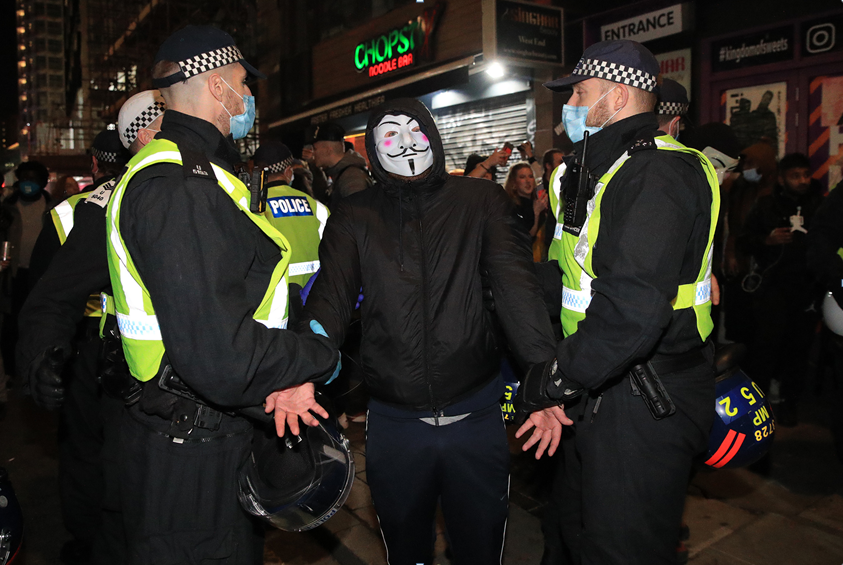
Police detain a protester during the Million Mask March anti-establishment protest at Trafalgar Square in London on Thursday, November 5. Aaron Chown/PA Images/Getty Images
At least 104 people were arrested at an anti-lockdown protest in London on Thursday evening, according to authorities in the British capital.
The protest in Trafalgar Square took place despite the coronavirus restrictions currently in place, and arrests were made after people refused to disperse, according to a statement by the London Metropolitan Police.
“Our main priority this evening has been to keep Londoners safe. We are eight months into this national pandemic and frankly there can be no excuse for people to dangerously breach regulations which are there to prevent further spread of Coronavirus,” said Commander Jane Connors, who is leading the operation.
Connors said the crowd “chose to ignore the new regulations, to behave irresponsibly and meet in a dangerous manner,” adding she expected further arrests to be made.
From CNN’s Fred Pleitgen in Berlin
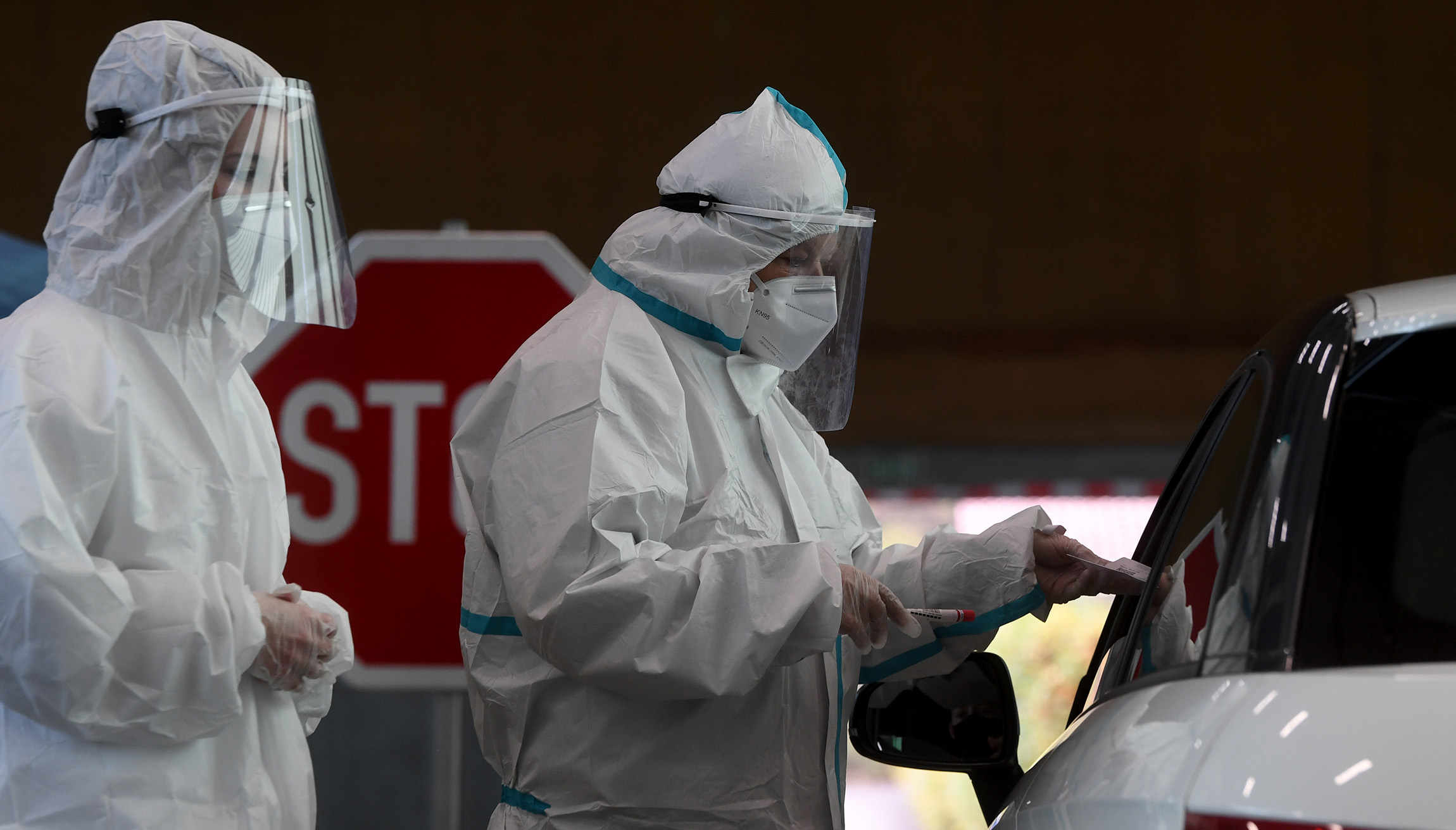
Medical staff hand a document to a driver after having taken a swab sample at a drive-through COVID-19 test center in Memmingen, Germany, on November 5. Christof Stache/AFP/Getty Images
Germany recorded 21,506 new Covid-19 cases for Thursday, the highest single-day rise since the pandemic began, according to the country’s center for disease prevention, Robert-Koch-Institute (RKI).
Thursday's caseload was an increase by more than 1,600 from the previous day, the RKI’s data shows.
The country also registered 166 new virus-related deaths on Thursday, bringing the total death toll to 11,096.
By CNN's Emma Reynolds, Livia Borghese and Barbara Wojazer
The Italian regions worst-hit by the second coronavirus wave entered a new lockdown Friday after the country tallied its highest daily number of both infections and deaths the previous day.
Italy is under a 10 p.m. to 5 a.m. nationwide curfew, with bars and restaurants closing at 6 p.m., while certain areas face harsher restrictions.
Residents in "red zone" regions -- Lombardy, Piedmont, Valle d'Aosta and Calabria -- may only leave home for necessities, health or work. Those in "orange zones" are banned from leaving their towns except for work or health reasons -- and bars and restaurants are closed except for delivery and takeout.
Italy reported 35,505 new cases and 445 deaths Thursday, taking its case total to 824,879 and fatalities to 40,192, according to health ministry data.
These figures "are not a good sign," said Gianni Rezza, director of the prevention department at the ministry. "The virus is running and we have to stop it."
Meanwhile in France: Paris also announced stricter measures as the country reported a record 58,046 new cases Thursday, according to the French health agency. The country has Europe's highest case number, at 1.6 million infections.
From Friday, food delivery, takeout and alcohol sales are banned in Paris between 10 p.m. and 6 a.m., police said.
"The second wave is already upon us, and it is brutal," French health minister Olivier Véran told a news conference Thursday. If the virus keeps spreading at this rate, he said "the second wave could be worse and longer" than the first, and could take "until mid-December" to stabilize.
Véran urged people to respect the national lockdown, or face "a high risk of saturation" of hospitals by mid-November.
Retrieved from: https://edition.cnn.com/world/live-news/coronavirus-pandemic-11-06-20-intl/index.html
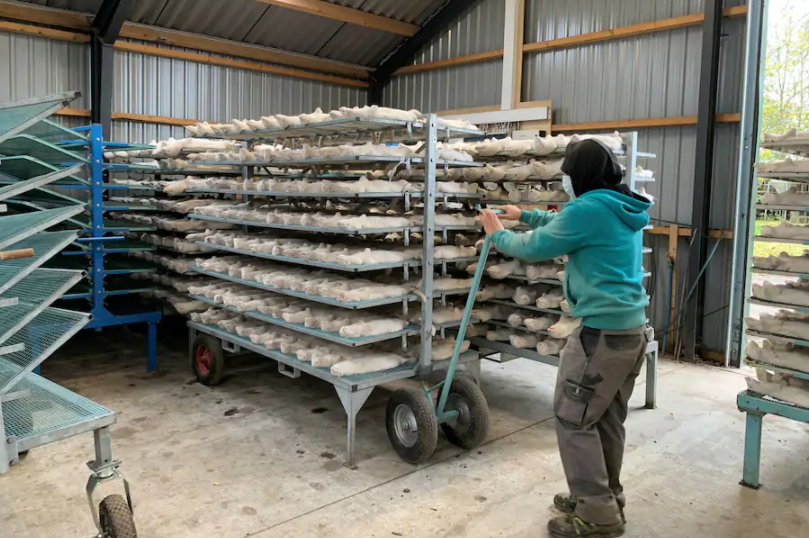
Culled minks are moved at a farm near Soro, Denmark, after the government’s decision to kill all 15 million minks in the country over coronavirus concerns. (Jacob Gronholt-Pedersen/Reuters)
The Danish government announced it would expand plans for a more limited cull and instead put down all of the country’s 15 million minks. Prime Minister Mette Frederiksen said Wednesday it was a “heavy decision” but the situation required “resolute action.”
Health Minister Magnus Heunicke said genomic analysis suggested nearly 400 human coronavirus cases in northern Denmark were related to mink farms, about half of all cases. About 5 percent of all human infections in the region involve the new mutation, the Serum Institut estimated.
“As a government, we will do everything we can to ensure that the mutated infection is contained and does not spread further,” Frederiksen said. “That’s why — unfortunately — it’s necessary to put down all minks in Denmark.”
In a worst-case scenario, there could be a new pandemic that starts all over again from Denmark, warned Kare Molbak, director of the division of infectious-diseases preparedness at Statens Serum Institut. Independent scientists, however, urged caution, as the institute has not yet publicly released details of the sequencing of the mutation.
Denmark has more than 1,000 mink farms that produce about 40 percent of the world’s mink pelts, the majority of which are exported to China and Hong Kong. Minks at 207 farms have tested positive for the coronavirus. Denmark plans to compensate mink farmers, but the government said it may be difficult for the industry to survive.
Even though the decision involves killing millions of animals, some welfare groups welcomed it as an opportunity to end to fur farms.
Coronavirus infections have already accelerated plans in the Netherlands to phase out the mink industry, with hundreds of thousands of animals euthanized after outbreaks there.
When the Netherlands began to kill animals in June, it said mink farms risked becoming a “virus reservoir,” presenting a risk to both human and animal health. A September study by Dutch experts found it “very likely” that minks had passed coronavirus infections back to employees in the first proven case of animal-to-human transmission.
Spain also euthanized nearly 100,000 minks in July, citing concerns that they might be able to spread the virus back to people. There have also been reports of minks contracting the virus at farms in the United States, where thousands of older animals have succumbed to it.
But no other country has reported a mink-related mutation that could endanger vaccine efforts.
Concern about animals as vectors has been present since the earliest research into the novel coronavirus. The U.S. Centers for Disease Control and Prevention does not consider animals to play a significant role in transmission, though minks have been identified as a possible exception.
Covid-19 is considered a “zoonotic” disease, meaning the virus that causes it would have originally come from an animal, possibly a bat. The first reported human cases were linked to a live-animal market in China.
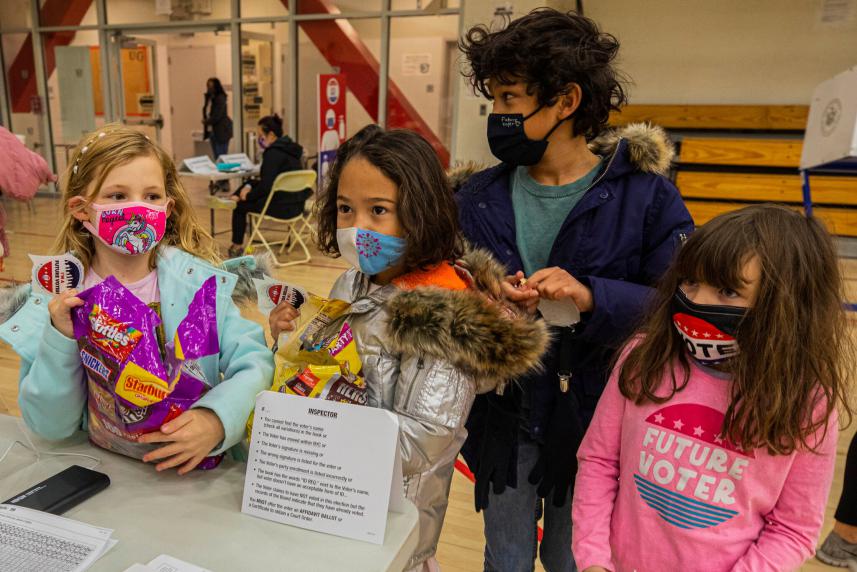
Neighborhood kids offering candies to polling volunteers on Tuesday. New finding on children’s immune response to the coronavirus were announced today.
Children who become infected with the coronavirus produced weaker antibodies and fewer types of them than adults do, according to a new study published Thursday in the journal Nature Immunology.
The findings suggest that children, who have powerful innate immunity, tend to vanquish the virus more rapidly, before it gains a foothold in the body. That hints at why most children are spared from Covid-19’s more severe symptoms, and may also explain why they are less likely than adults to spread the virus to others.
“They may be infectious for a shorter time,” said Donna Farber, an immunologist at Columbia University in New York who led the study.
The researchers analyzed antibodies to the coronavirus in four groups of patients: 19 adult convalescent plasma donors who recovered from Covid-19 without being hospitalized; 13 adults who were hospitalized with acute respiratory distress syndrome resulting from severe Covid-19; 16 children who were hospitalized with multi-system inflammatory syndrome, the rare condition that affects some children infected with the coronavirus; and 31 infected children who did not have the syndrome. About half of this last group of children had no symptoms at all.
Individuals in each group produced antibodies, a finding that is consistent with other studies showing that the vast majority of people who become infected with the coronavirus mount a robust antibody response.
“This further emphasizes that this viral infection in itself, and the immune response to this virus, is not that different from what we would expect” from any virus, said Petter Brodin, an immunologist at Karolinska Instituet in Stockholm.
But the range of antibodies that children produced differed from those of adults. Children primarily made one type of antibody, called IgG, that binds to the spike protein on the surface of the virus. Adults, by contrast, made several types of antibodies that bind to the spike protein and other viral proteins, and these antibodies were more powerful than IgG at neutralizing the virus.
Children had “less of a protective response, but they also had less of a breadth of an antibody response,” Dr. Farber said. “It’s because those kids are just not getting infected as severely.”
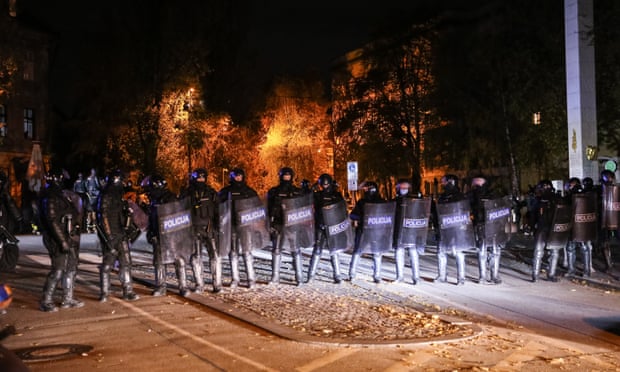
Police officers stand guard as protesters gather for the rally against a ban on movements which was extended by the government to curb the spread of the novel coronavirus pandemic in Ljubljana, Slovenia on 5 November 2020. Photograph: Anadolu Agency/Getty Images
A protest against Slovenia’s coronavirus shutdown sparked some of the most violent scenes the country has seen in years, AFP reports, as police moved in with teargas and water cannons to disperse the crowd.
The rally in the capital Ljubljana, organised by activists calling themselves the Slovenian branch of cyber group Anonymous, started late in the afternoon and led to several injuries and arrests as the protesters clashed with police.
Several hundred people gathered in front of the Slovenian parliament building, with some attacking police officers who warned them that public gatherings were banned due to the coronavirus shutdown.
The demonstrators threw bottles, firecrackers, stones and smoke bombs at anti-riot police who responded with tear gas, pepper spray and water cannon.
While Slovenia was relatively unscathed by the first wave of the coronavirus pandemic earlier this year, last month the government ordered a second shutdown to try to halt a surge in infections which has seen the total number of cases pass 41,000 in the country of two million.
The measures include a curfew, restrictions on travel and the closure of schools and non-essential shops.
Thursday’s protest was the most violent in Slovenia since a series of demonstrations in Ljubljana and Slovenia’s second city Maribor in 2012-2013 against local and state authorities, who the protesters blamed for an economic crisis in the tiny eurozone state.
Here are the key developments from the last few hours:
· The United States has again recorded more cases in 24 hours than any country over the course of the pandemic, with 120,000 infections confirmed for Thursday 5 November. The country also recorded more than 1,000 deaths for the fourth time this week, with 1,200 people reported dead in the last 24 hours. The previous record for cases, also held by the US, was 102,000 the day before.
· Globally, the world suffered the highest total one-day death toll of the pandemic so far, with 11,447 people lost in the last day. It also recorded more cases than ever before, partly as a result of rising cases in the US, but also because of Europe’s second wave, and more than 50,000 infections being recorded in India for the first time in 10 days.The global case total was 700,000, taking the world closer to 50m cases – a devastating milestone that we are likely to cross by the end of the week. Cases currently stand at 48,541,340.
· Denmark removed from UK travel corridor, meaning arrivals must self-isolate. The UK’s secretary of state for transport, Grant Schapps, has removed Demnark from the country’s “travel corridor”, which means all arrivals from Denmark will need to self-isolate for 14 days, starting at 4am Friday morning.The reason for the removal is the spread of coronavirus to people from an outbreak among mink on mink farms in the country, Shapps wrote in a statement.
· Slovenia anti-virus shutdown protest turns violent. A protest against Slovenia’s coronavirus shutdown sparked some of the most violent scenes the country has seen in years, as police moved in with teargas and water cannons to disperse the crowd. The rally of several hundred in the capital Ljubljana, organised by activists calling themselves the Slovenian branch of cyber group Anonymous, started late in the afternoon and led to several injuries and arrests as the protesters clashed with police.
· China bars arrivals from France over virus fears. Beijing on Thursday banned foreign arrivals from France and a host of other countries, the latest in a growing number of entry bans as China closes itself off from a world still battling the coronavirus pandemic. Covid-19 first emerged in central China late last year, but Beijing has largely brought its outbreak under control through tight travel restrictions and stringent health measures for anyone entering the country.
· WHO urged to invite Taiwan to key meeting. The World Health Organization is facing renewed pleas to allow Taiwan to participate in a key international meeting amid fears its exclusion could jeopardise efforts to rein in the coronavirus pandemic,
· Greece will go back into lockdown from Saturday for three weeks to battle a second wave of the coronavirus, Prime Minister Kyriakos Mitsotakis announced. Under the measures, Greeks can only leave their homes if they make an official request via mobile phone and then receive authorisation.Only “essential shops” including supermarkets and pharmacies can stay open when the lockdown starts at 6am (0400 GMT) on Saturday, Mitsotakis said.
· WHO warns of ‘explosion’ of virus cases in Europe. The World Health Organization in Europe on Thursday said it was seeing an “explosion” of coronavirus cases in the region and warned of a “tough time” ahead as mortality rates rose.“We do see an explosion.... in the sense it only takes a couple of days to have over the European region an increase of one million cases,” WHO’s regional director for Europe Hans Kluge told AFP.
· The UK death toll from coronavirus rose by 378, taking the tally of people who died within 28 days of testing positive for Covid-19 to 48,120, government data showed. As of 9am GMT on Thursday, there had been a further 24,141 lab-confirmed cases in the UK, taking the cumulative total of confirmed infections to 1,123,197.
· Colombia’s lower house abruptly ended its session on and asked lawmakers to quarantine after a member tested positive for Covid-19. At least 150 lawmakers could potentially have been exposed, the chamber’s press office said. They have been told to avoid travel to their home regions and remain in Bogota while they wait 72 hours from potential exposure to have a test.
· A dozen US states reported record one-day increases in Covid-19 cases, a day after the country set a record with nearly 105,000 new infections reported on Wednesday, according to a Reuters tally. The outbreak is spreading in every region of the country but is hitting the Midwest the hardest, based on new cases per capita. Illinois reported nearly 10,000 new cases and along with Texas is leading the nation in the most cases reported in the last seven days.Other Midwestern states with record increases in cases on Thursday were Indiana, Iowa, Minnesota, Missouri, North Dakota and Ohio. Arkansas, Maine, Oklahoma, Rhode Island, Utah and West Virginia also set records for rises in new infections.
· Ireland is on track to get its second wave of Covid-19 infections under control by the end of November when the government hopes to ease some of the strictest restrictions in Europe, a senior public health official said. “The way case numbers are behaving would suggest that case numbers are declining rapidly and that we are on target for the sort of end position we want to be in at the end of the six weeks,” on 1 December, Philip Nolan, the chair of the Irish Epidemiological Modelling Advisory Group, told a press briefing.